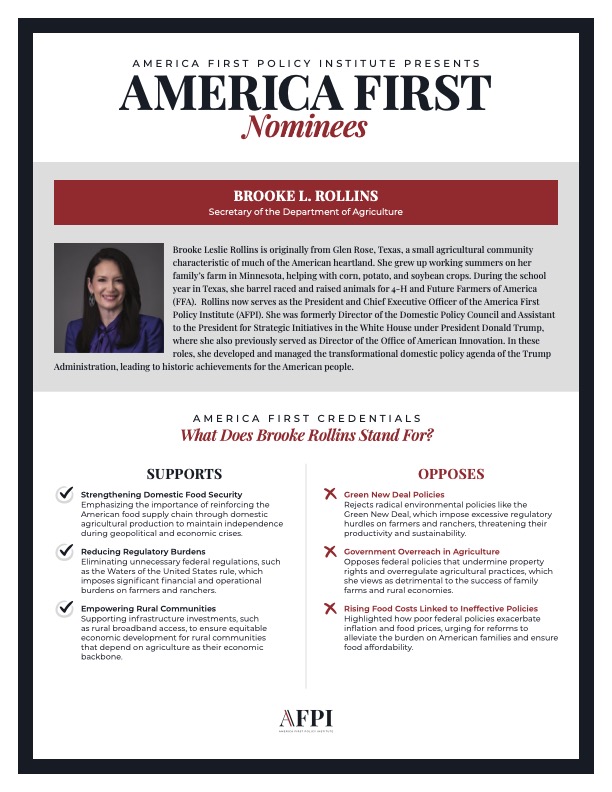America First Nomination: Brooke Rollins
Biography
Brooke Leslie Rollins is from Glen Rose, Texas, a small agricultural community in the American heartland. She grew up working summers on her family’s farm in Minnesota, helping with corn, potato, and soybean crops. During the school year in Texas, she barrel raced, raised livestock for 4-H and Future Farmers of America (FFA), and rose to leadership in both.
Rollins now serves as the President and Chief Executive Officer of the America First Policy Institute (AFPI). She was formerly Director of the Domestic Policy Council and Assistant to the President for Strategic Initiatives in the White House under President Donald Trump, for whom she also previously served as Director of the Office of American Innovation. In these roles, she led the transformational domestic policy agenda of the Trump Administration, enacting President Trump’s vision and leading to historic achievements for the American people.
Rollins graduated with honors from Texas A&M University with a Bachelor of Science in agricultural development and was the first woman in university history to be elected student body president. After earning her Juris Doctor with honors at the University of Texas School of Law, she served as Governor Rick Perry’s policy director before leading the Texas Public Policy Foundation (TPPF) for 15 years. At TPPF, Rollins elevated a small policy organization to a national force and redefined the possibilities for a state-based think tank—setting the model and aspiration for AFPI.
Rollins and her husband, Mark, currently reside in Fort Worth, Texas, and spend their free time taxiing their four very active children to baseball games, cattle shows, piano lessons, and Aggie football games. Their children now participate in 4H and FFA, and she still keeps livestock at her home—a chicken and sometimes a donkey.
America First Credentials
Supports
Strengthening Domestic Food Security
Emphasizing the importance of reinforcing the American food supply chain through domestic agricultural production to maintain independence during geopolitical and economic crises.
Reducing Regulatory Burdens
Eliminating unnecessary federal regulations, such as the Waters of the United States rule, which imposes significant financial and operational burdens on farmers and ranchers.
Empowering Rural Communities
Supporting infrastructure investments, such as rural broadband access, to ensure equitable economic development for rural communities that depend on agriculture as their economic backbone.
Opposes
Green New Deal Policies
Rejects radical environmental policies like the Green New Deal, which impose excessive regulatory hurdles on farmers and ranchers, threatening their productivity and sustainability.
Government Overreach in Agriculture
Opposes federal policies that undermine property rights and overregulate agricultural practices, which she views as detrimental to the success of family farms and rural economies.
Rising Food Costs Linked to Ineffective Policies
Highlighted how poor federal policies exacerbate inflation and food prices, urging for reforms to alleviate the burden on American families and ensure food affordability.
